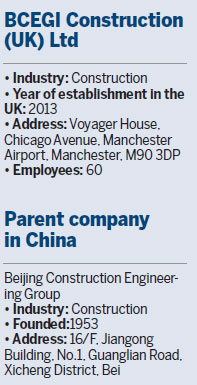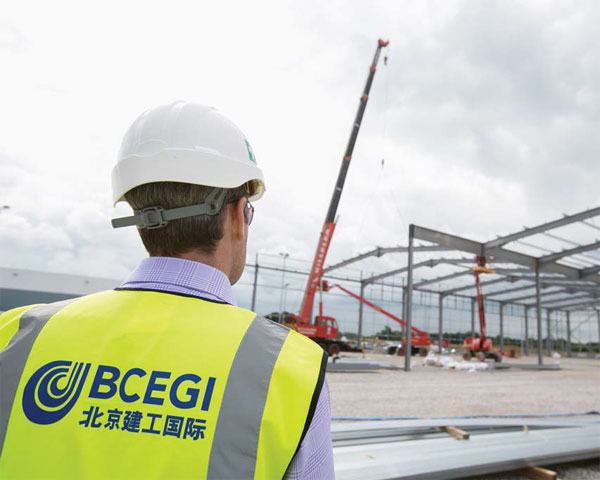Chinese giant makes inroads into the UK's infrastructure
Company looks to Northern Powerhouse project, which presents a wide range of opportunties
Beijing Construction Engineering Group is making big strides into the UK's construction market at a time when the country requires rapid infrastructure growth.
The company has the advantage of extensive experience accumulated from numerous Chinese and global projects over the years.
It made a name for itself in the UK in 2014 by becoming one of the two contractors for Manchester's 800 million ($1.3 billion; 956 million euros) Airport City Manchester project.
|
Beijing Construction Engineering Group works on the Airport City Manchester project. Provided to China Daily |
Now it has established a solid foothold in the UK with two additional property development projects.
It is continuing to look for new opportunities, especially infrastructure projects related to the Northern Powerhouse - the UK government's program to revitalize growth in northern England through infrastructure construction, which is set to become more important after Brexit.
"We see a lot of opportunities for future expansion in the UK market. Our goal is to look for suitable projects in the UK, and in particular northwest England, because we think the UK's Northern Powerhouse strategy will bring many opportunities," says Yu Dongwen, UK operations director of BCEG.
BCEG, which was established in Beijing in 1953, already has a presence in many developing countries. It expanded into Western markets in 2007 by building a hospital in Dallas, Texas. BCEG also worked on other projects in the US, Canada and Australia. Examples include a retirement home in Los Angeles and a commercial center in Australia.
BCEG's first project in Europe was Airport City Manchester, with the company responsible for 50 percent of the construction work, alongside the British contractor Carillion. It is also an equity partner, investing a 20 percent stake into the project.

Spread over an area of 465,000 square meters, the project includes construction of offices, hotels, advanced manufacturing facilities, and logistics and warehousing facilities.
Yu says his team has already made significant progress on the basic infrastructure work for the project, aiming to finish the majority of infrastructure work in 2017. It has already started designing hotels and offices for construction this year.
BCEG's involvement in Airport City Manchester can be traced back to 2011 when the UK and China signed an infrastructure cooperation agreement. In 2013, when former prime minister David Cameron went to Beijing to promote the project, BCEG was invited to bid for it as a part of a consortium.
"We see Airport City Manchester as a first step into the UK market and an opportunity for us to gain experience and understand the UK's construction market, so that we can take on bigger projects gradually and with more confidence," Yu says.
He says experience can relate to construction methods, working with local contractors and suppliers, maintaining a good relationship with the British government, setting up local teams and developing a working relationship with local advisers.
BCEG's efforts won praise from Lynda Shillaw, CEO of MAG Property, the property arm of Manchester Airport Group.
"BGEG is a valuable partner in the development of Airport City and a positive example of the inward investment that is being attracted from China," she says.
"This is the first major infrastructure project in the UK with the involvement of a Chinese company as an equity partner, and it demonstrates how a new wave of investment from China is transforming infrastructure and development in the UK," Shillaw says.
After building a reputation with the Airport City Manchester project, BCEG successfully started two new projects. The first was Middlewood Locks, a residential project that employed the Beijing-based company as a design and construction contractor.
The second is St Michael's, a residential and commercial property development that has two tall towers and is located in the heart of Manchester, near Town Hall.
BCEG is investing a 21 percent stake in St Michael's, and is in charge of design and construction. It will play a supporting role in sales by promoting the residential and office units in China.

Yu says BCEG's key advantages in the UK market include its competitive edge as a highly international company, and its comprehensive supply chain.
"The UK construction market is very mature. It has a good legal framework and we can learn a lot of lessons here; but still, the amount of construction going on in the UK is nothing compared to China.
"In Manchester, for example, the only tall tower in the city is the Hilton Hotel. The rest of the buildings here are quite old, so perhaps compared with local construction companies we have a lot of experience."
BCEG has worked on many recent big projects in China, like the new offices of the Beijing government, the headquarters of the Asian Infrastructure Investment Bank, the APEC conference center and the Beijing New Airport, among others.
BCEG has offices in 27 countries so it has accumulated experience from different international markets.
In addition, it has a comprehensive supply chain.
"We can supply our UK projects with cost-effective materials, which are either our own materials or materials from our existing suppliers in China," Yu says.
He explains that many European construction firms would actually like to buy materials from China, but the fact that BCEG is a Chinese company and knows the Chinese market well means it can source the most cost-effective materials with the same quality.
In addition, BCEG's role as an investment partner in some projects where it is also the contracted builder means it is able to become involved in the project at an early stage.
"This means we can give the project owner advice on what is possible and efficient, so that their initial designs are made with construction practicality in mind. Then there will not be so many alterations at later stages," Yu says.
Christopher Bovis, professor of European and international business law at the University of Hull, says the ability of Chinese firms like BCEG to act as both financial investors and construction contractors helps with their profitability.
"As a financial investor, they can be incentivized to improve the efficiency of the supply chain and create savings through volume, so the project will generate better returns."
BCEG's international expansion fits into the trend of Chinese infrastructure builders going global, supported by the Chinese government. Examples of such companies include Liaoning Fortone, a private construction business in Shenyang, currently constructing two 299-megawatt combined heat and power stations in Wales, and China Triumph International Engineering Co, which built six solar farms in the UK.
Yu says BCEG's internationalization strategy fits roughly into three phases, which apply to many Chinese construction companies in general.
The first was in the 1970s, when China sent many construction workers to developing nations, such as parts of Africa, as a part of its financial aid. A lot of those first projects built according to Chinese standards and much of the construction was done by Chinese workers, he says.
The second phase mainly happened in Southeast Asian countries, before the Asian Financial Crisis.
The third phase happened after 2000.
"This third phase involved much of the expansion into developed markets, such as the UK," says Yu. During this process we have taken on a different model of expansion. In developed markets, where we cannot easily second many employees, we mostly rely on local partners and play the role of project managers, leveraging on our experiences and management skills."
Looking into the future, Yu says his team is keen to expand across Europe, and especially in the UK.
He believes construction opportunities in northwestern England will not be affected by Brexit-related uncertainties because the UK market is currently at a point where population growth is creating a large demand for property, and this demand is not being met by current market supply.
"Brexit means the UK needs to generate more growth from its own economy, and the Northern Powerhouse can supply a lot of this growth. The fact that many Chinese companies are interested in Northern Powerhouse-related investment opportunities means that we can play a role in leading these investments, and invest alongside other Chinese companies," says Yu.
cecily.liu@mail.chinadailyuk.com
(China Daily European Weekly 01/06/2017 page30)























